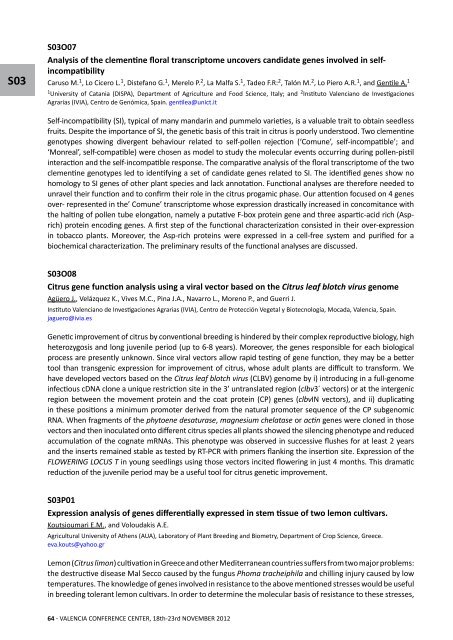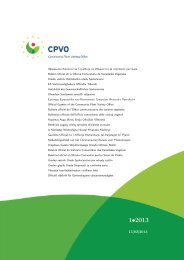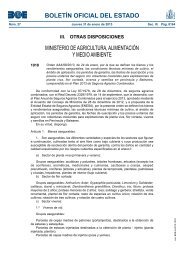- Page 3 and 4:
THE XII INTERNATIONAL CITRUS CONGRE
- Page 5 and 6:
WELCOME MESSAGE On behalf of the In
- Page 7 and 8:
Members Dr. FLORENTINO JUSTE Direct
- Page 9 and 10:
Poster presentations All posters ar
- Page 11:
SPONSORS XII INTERNATIONAL CITRUS C
- Page 15:
WE TAKE CARE Managing and adding va
- Page 19:
Scientific Programme
- Page 22 and 23:
SCIENTIFIC PROGRAMME Note: Sessions
- Page 24 and 25:
SESSION 01: Citrus germplasm and ph
- Page 26 and 27:
Poster ID Title S02P01 S02P02 S02P0
- Page 28 and 29:
Poster ID Title S02P37 S02P38 S02P3
- Page 30 and 31:
SESSION 05: BIOTECHNOLOGY Oral pres
- Page 32 and 33:
Poster ID Title S05P19 S05P20 S05P2
- Page 34 and 35:
Poster ID Title S06P08 S06P09 S06P1
- Page 36 and 37:
SESSION 08: Abiotic stress Oral pre
- Page 38 and 39:
SESSION 09: Postharvest physiology
- Page 40 and 41:
Poster ID Title S09P20 S09P21 S09P2
- Page 42 and 43:
Poster ID Title S10P01 S10P02 S10P0
- Page 44 and 45:
Oral ID Title S11O03 S11O04 S11O05
- Page 46 and 47:
Oral ID Title S12O04 S12O05 S12O06
- Page 48 and 49:
Poster ID Title S12P23 S12P24 S12P2
- Page 50 and 51:
Poster ID Title S13P01 S13P02 S13P0
- Page 52 and 53:
Poster ID Title S14P04 S14P05 S14P0
- Page 54 and 55:
SESSION 15: Fungal diseases Oral pr
- Page 56 and 57:
Poster ID Title S15P24 S15P25 S15P2
- Page 58 and 59:
Poster ID Title S16P06 S16P07 S16P0
- Page 60 and 61:
Poster ID Title S16P40 S16P41 S16P4
- Page 62 and 63:
Poster ID Title S17P17 S17P18 S17P1
- Page 64 and 65:
Poster ID Title S18P06 S18P07 S18P0
- Page 66 and 67:
Poster ID Title S20P01 S20P02 S20P0
- Page 68 and 69:
Poster ID Title S21P16 S21P17 S21P1
- Page 71:
Plenary Conferences PC01 The Spanis
- Page 74 and 75:
Drip irrigation introduced in the 8
- Page 76 and 77:
Global warming and its impact on cl
- Page 78 and 79:
egional, i.e. applied on an area-wi
- Page 80 and 81:
PC07 Biological control and citrus:
- Page 83 and 84: W01 HLB control Convener: J.M. Bov
- Page 85 and 86: mandarin cultivars such as `Fortune
- Page 87 and 88: • Open: All growers have free acc
- Page 89 and 90: Genetic restriction of fruit tree s
- Page 91 and 92: W08 Global citrus industry collabor
- Page 93: forced-air, vapor heat, cold, and i
- Page 97 and 98: S01O01 Citron germplasm in Yunnan,
- Page 99 and 100: citrus cultivars are interspecific
- Page 101 and 102: S01P06 Diversity analysis of citrus
- Page 103: Our results demonstrate that the ci
- Page 107 and 108: S02O01 The triploid mandarin breedi
- Page 109 and 110: S02O06 Citrus breeding in South Afr
- Page 111 and 112: furanocoumarins. However, a particu
- Page 113 and 114: or horticultural traits, but truene
- Page 115 and 116: S02P06 Preliminary research on gene
- Page 117 and 118: S02P11 Development CTV resistant ci
- Page 119 and 120: S02P16 Mechanism of seedlessness in
- Page 121 and 122: S02P21 Haploid and polyploid hybrid
- Page 123 and 124: agronomically characterized 79 hybr
- Page 125 and 126: 2011. Early production was achieved
- Page 127 and 128: are vigorous with nearly round-shap
- Page 129: Session 03 CITRUS GENOMICS S03
- Page 132 and 133: S03 of large genomic regions. Seque
- Page 136 and 137: S03 and recombinant DNA technology.
- Page 138 and 139: S03 TFs. Some of them are MADS-box
- Page 140 and 141: S03 S03P13 Fast and cost-effective
- Page 143: Session 05 BIOTECHNOLOGY S05
- Page 146 and 147: S05 the regulation of carotenogenes
- Page 148 and 149: S05 stoma density, size and opening
- Page 150 and 151: S05 S05P02 Comprehending crystallin
- Page 152 and 153: S05 S05P07 D-limonene downregulatio
- Page 154 and 155: S05 to this disease. Development of
- Page 156 and 157: S05 tomato constitutively express L
- Page 158 and 159: S05 deletor’ technology is an eff
- Page 160 and 161: S05 sour orange seedlings. The embr
- Page 162 and 163: S05 biodegradable makes them attrac
- Page 165 and 166: S06O01 Effect of male-female intera
- Page 167 and 168: S06O06 Endogenous factors affecting
- Page 169 and 170: lowest levels at fruit mature stage
- Page 171 and 172: (5.6% of the total citrus area) wit
- Page 173: almost disappeared and total yield
- Page 177 and 178: S07O01 Citrus developmental researc
- Page 179 and 180: S07O06 Exploring microRNA target mo
- Page 181 and 182: set of the orange varieties ‘Wash
- Page 183 and 184: S07P10 Transcript accumulation of f
- Page 185:
Session 08 ABIOTIC STRESS S08
- Page 188 and 189:
S08 present study, we identified pr
- Page 190 and 191:
S08 S08O08 Microsprinkler irrigatio
- Page 192 and 193:
S08 S08P05 Role of ammonium nutriti
- Page 194 and 195:
S08 S08P10 Cloning and functional a
- Page 196 and 197:
S08 S08P15 Flooding and soil temper
- Page 198 and 199:
S08 S08P20 Orange varieties as inte
- Page 200 and 201:
S08 In a field experiment, the tole
- Page 203 and 204:
S09O01 Genome sequence of the necro
- Page 205 and 206:
calcofluor white (CFW) or congo red
- Page 207 and 208:
a continuous flow-through system (2
- Page 209 and 210:
experimental evidences in mandarin
- Page 211 and 212:
for 14 days was investigated. Chang
- Page 213 and 214:
S09P13 Organoleptic quality and pre
- Page 215 and 216:
SOD activity in the Δsod1 mutant w
- Page 217 and 218:
were observed. Thus, other possible
- Page 219 and 220:
fruits received the following treat
- Page 221 and 222:
3) to evaluate different treatments
- Page 223:
acid, sodium carbonate and sodium m
- Page 227 and 228:
S10O01 Open hydroponics of citrus c
- Page 229 and 230:
gas exchange, foliar SPAD index and
- Page 231 and 232:
y citrus and consequent effects on
- Page 233 and 234:
strongly decreased with the applica
- Page 235 and 236:
strategies. The aim of this work wa
- Page 237 and 238:
S10P15 Efficiency of zinc (68Zn) fe
- Page 239 and 240:
S10P20 Phosphorus deficiency decrea
- Page 241 and 242:
S10P25 Foliar nutrition with macron
- Page 243:
S10P30 Use of plant-soil-atmosphere
- Page 247 and 248:
S11O01 New method of citrus graftin
- Page 249 and 250:
S11O06 Reduction of fruit splitting
- Page 251 and 252:
S11P03 Evaluation of rootstocks for
- Page 253 and 254:
S11P08 Production of ‘Tahiti’ a
- Page 255 and 256:
season and test a range of varietie
- Page 257 and 258:
S11P18 A phytosanitary evaluation m
- Page 259:
over 50% of the infested fields. Th
- Page 263 and 264:
S12O01 New insights into the citrus
- Page 265 and 266:
or Huanglongbing (HLB) and its vect
- Page 267 and 268:
trapping program, visual surveys, p
- Page 269 and 270:
S12P01 Yield loss modeling of “Ca
- Page 271 and 272:
amplify different geographical Huan
- Page 273 and 274:
affects all known citrus species an
- Page 275 and 276:
S12P15 Systemic insecticides are ef
- Page 277 and 278:
S12P20 Heat treatment of Huanglongb
- Page 279 and 280:
leaves. Although XCT44 produces les
- Page 281 and 282:
incidence of canker. Only in the ye
- Page 283 and 284:
lime were treated with chitosan (CH
- Page 285 and 286:
S12P39 Unforbidden fruits: Preventi
- Page 287:
S12P43 Analysis of citrus huanglonb
- Page 291 and 292:
S13O01 Application of the Sterile I
- Page 293 and 294:
(SIT) application. Both mass-trappi
- Page 295 and 296:
S13P03 An early step toward the dev
- Page 297 and 298:
S13P07 Potential of secondary metab
- Page 299 and 300:
climatic conditions, including Tuni
- Page 301:
Session 14 VIRUS AND VIRUS LIKE DIS
- Page 304 and 305:
S14 even if infected, an investigat
- Page 306 and 307:
S14 S14O08 New generation sequencin
- Page 308 and 309:
S14 stunting and low fruit yield an
- Page 310 and 311:
S14 S14P06 Molecular diversity of C
- Page 312 and 313:
S14 along the Ionian coast and the
- Page 314 and 315:
S14 S14P15 Integrated Citrus Triste
- Page 316 and 317:
S14 infected tree incites the psoro
- Page 318 and 319:
S14 Conformation Polymorphism (SSCP
- Page 320 and 321:
S14 infected trees, while bark scal
- Page 322 and 323:
S14 grafted on C. volkameriana, sou
- Page 325 and 326:
S15O01 The arrival of Citrus Black
- Page 327 and 328:
S15O06 Epidemiology of Alternaria B
- Page 329 and 330:
S15O11 Searching for citrus rootsto
- Page 331 and 332:
S15P05 Modelling of Guignardia pseu
- Page 333 and 334:
S15P10 Outbreak and occurrence of A
- Page 335 and 336:
concerns have prompted governments
- Page 337 and 338:
control strategies. A survey was in
- Page 339 and 340:
Santa Barbara, Tulare, and Ventura.
- Page 341:
into two groups: one dried in the s
- Page 345 and 346:
S16O01 The status of citrus IPM in
- Page 347 and 348:
S16O06 Progress toward integrated m
- Page 349 and 350:
was uniform under the non-UV-blocki
- Page 351 and 352:
S16O16 Field evaluation of some pes
- Page 353 and 354:
S16P01 Analysis of population trend
- Page 355 and 356:
S16P06 Use of oils to control the A
- Page 357 and 358:
stage, nymphs and eggs that were ob
- Page 359 and 360:
S16P16 Repellency and acceptability
- Page 361 and 362:
could be described by the Holling I
- Page 363 and 364:
S16P25 Assessment of trophic intera
- Page 365 and 366:
S16P30 Composition and flight activ
- Page 367 and 368:
2010 and 2011, the efficacy of spra
- Page 369 and 370:
were: esfenvalerate (0.25); deltame
- Page 371 and 372:
S16P44 Preliminary survey of the Gr
- Page 373:
Session 17 VARIETIES S17
- Page 376 and 377:
S17 included represent California,
- Page 378 and 379:
S17 S17P01 Plant growth, initial fr
- Page 380 and 381:
S17 S17P06 Fruit characteristics of
- Page 382 and 383:
S17 S17P11 Evaluation of Lemon Sele
- Page 384 and 385:
S17 S17P16 New tangors for Brazilia
- Page 386 and 387:
S17 growing areas are from Coquimbo
- Page 388 and 389:
S17 recorded during the previous 21
- Page 391:
Session 18 ROOTSTOCKS S18
- Page 394 and 395:
S18 sinensis × Poncirus trifoliata
- Page 396 and 397:
S18 lower and higher ML yields/tree
- Page 398 and 399:
S18 S18P03 Effect of the rootstock
- Page 400 and 401:
S18 S18P08 Agronomic performance of
- Page 402 and 403:
S18 potentially very interesting fo
- Page 404 and 405:
S18 favorable for the citrus indust
- Page 406 and 407:
S18 overfruiting and temperature du
- Page 408 and 409:
S18 S18P28 Tree performance and fru
- Page 411:
Session 20 CITRUS AND HEALTH S20
- Page 414 and 415:
S20 and ascorbic acid, acting indiv
- Page 416 and 417:
S20 dysfunction. Microarray studies
- Page 418 and 419:
S20 of satsuma, however, (even some
- Page 421:
Session 21 POSTHARVEST AND JUICE PR
- Page 424 and 425:
S21 determined by HPLC. Results ind
- Page 426 and 427:
S21 flowers of different cultivars
- Page 428 and 429:
S21 pallet and in the fruits) 40 di
- Page 430 and 431:
S21 effectiveness or completely ine
- Page 432 and 433:
S21 of Agriculture for agricultural
- Page 435:
Session 22 CITRUS ECONOMICS AND TRA
- Page 438 and 439:
S22 slowed down. USA is currently t
- Page 440 and 441:
S22 growers, this requires permanen
- Page 442 and 443:
S22 demand is growing due to knowle
- Page 445:
Author’s Index
- Page 448 and 449:
Beitia F. 228 Belda J.E. 290 Beldom
- Page 450 and 451:
del Pino A. 330, 333 Del Río J.A.
- Page 452 and 453:
Gush M.B. 157 Guven B. 288 Guzmán-
- Page 454 and 455:
Lo Presti P. 244 Locali E.C. 204 Lo
- Page 456 and 457:
Orce I.G. 208 Ordúz J. 239 Orea Ve
- Page 458 and 459:
Sela I. 107 Sela N. 133, 146, 264 S
- Page 460:
Xie Y.M. 87 Xin-Hua H. 28 Xingzheng




